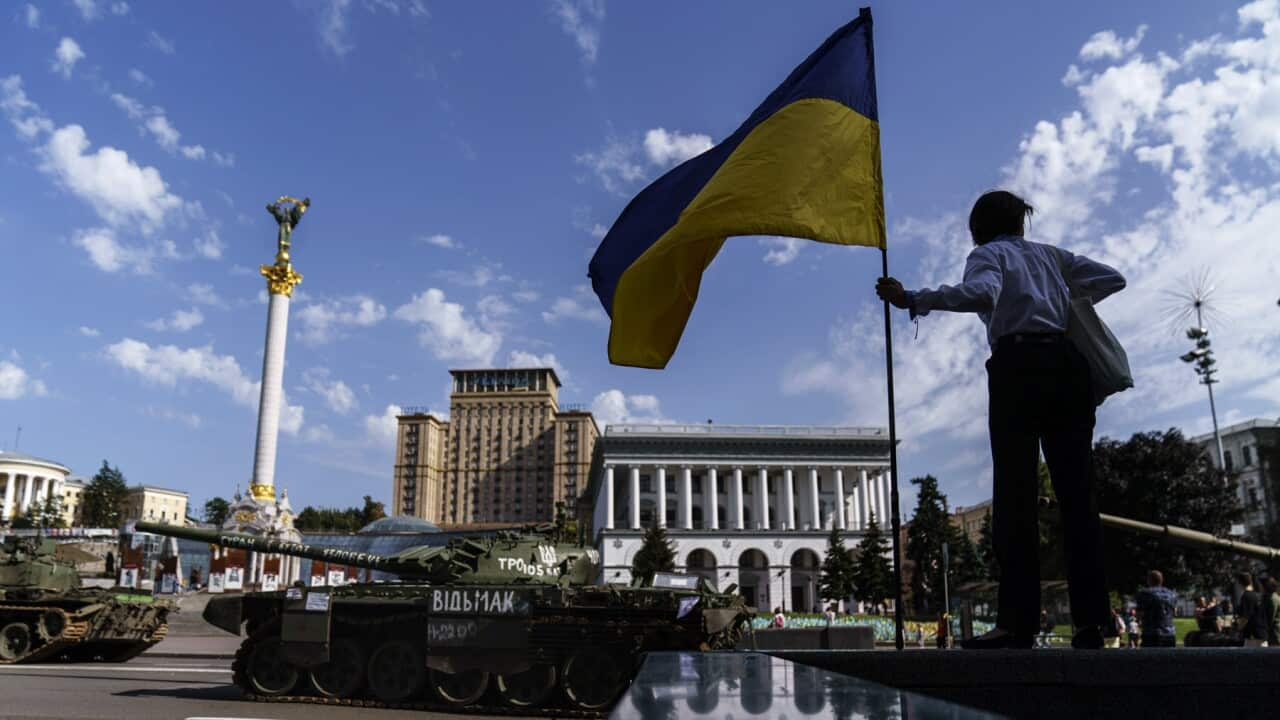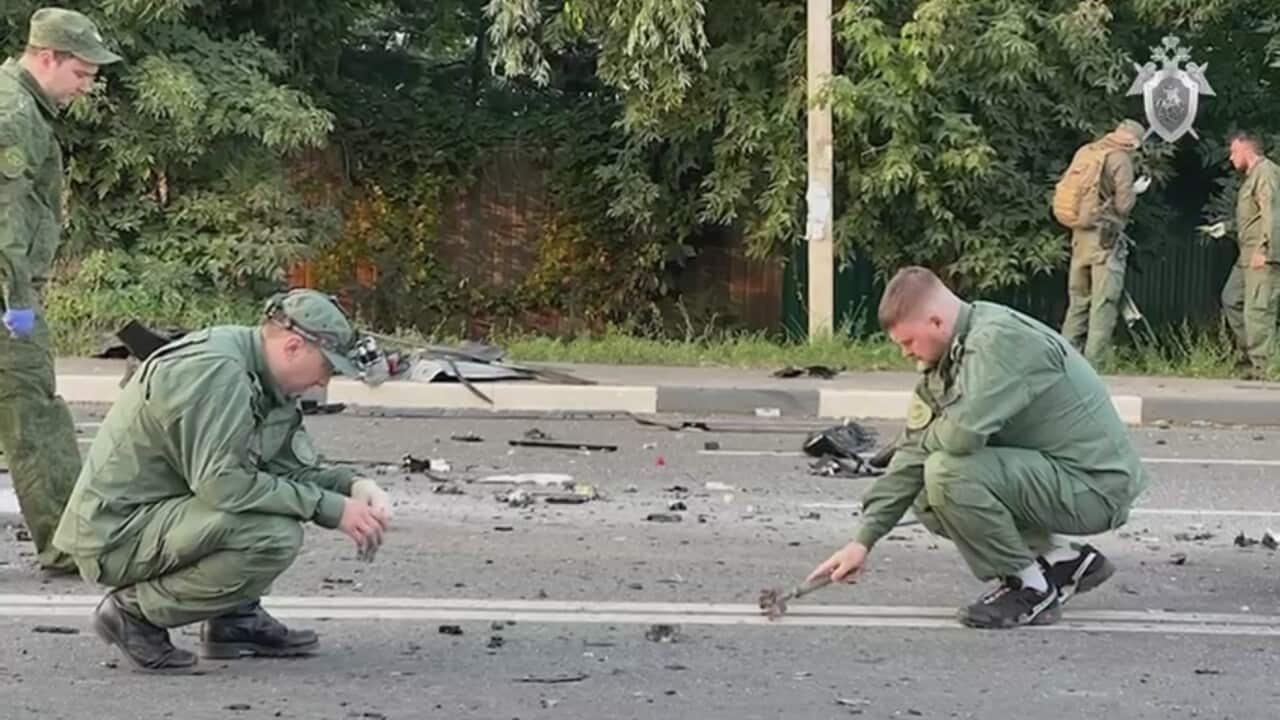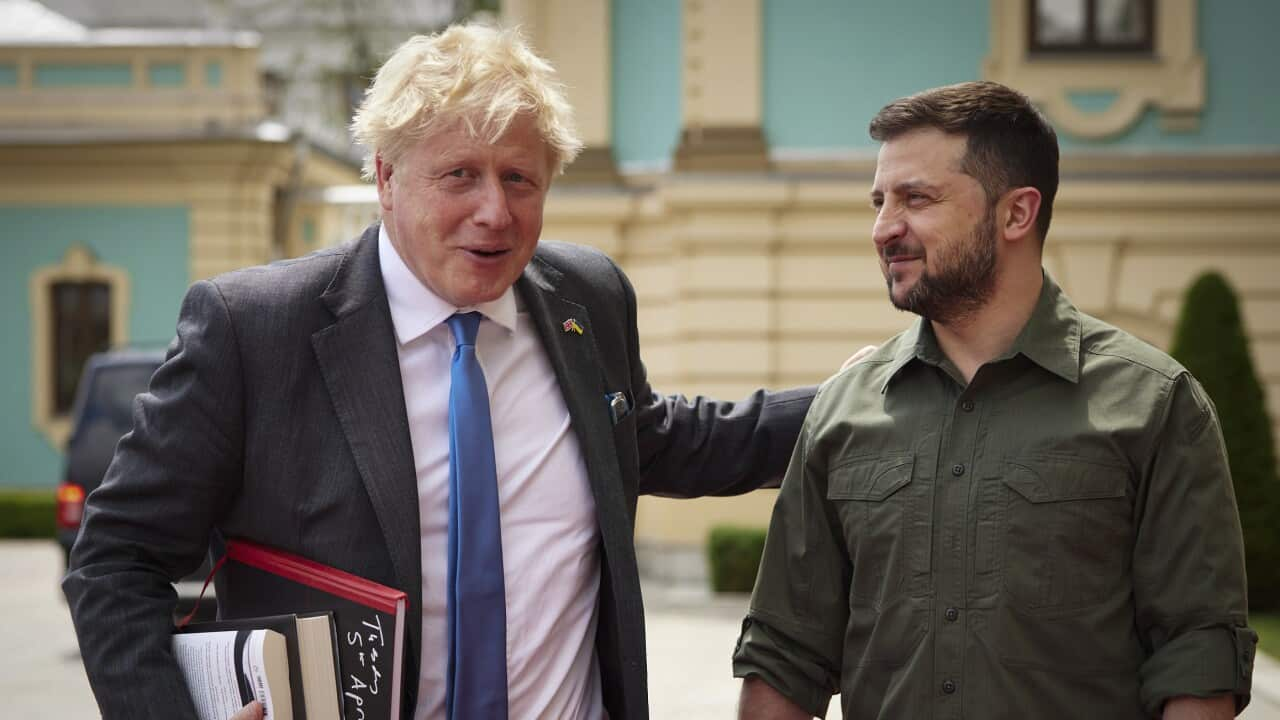Key Points
- Wednesday 24 August is Ukraine's independence day
- It also marks six months since the Russian invasion began
Wednesday 24 August is Ukraine's independence day, but it's a muted celebration, with the day also marking six months since the Russian invasion began.
Russia now controls large parts of Eastern Ukraine and has also occupied much of the south, including the city of Mariupol, the site of some of the bloodiest battles of the conflict as well as the major economic centre of Kherson.
Ukrainian forces have managed to launch several counter-attacks, particularly around Kharkiv, while there have been a series of successful operations behind enemy lines, including in occupied Crimea.

It's been six months since Russia invaded Ukraine. Here's how much territory Russian forces control. Source: Institute for the Study of War. Credit: SBS News
Western officials say Russia has lost between 70,000 to 80,000 soldiers. That number includes the dead and those wounded in action.
The United Nations says 5,500 civilians have have lost their lives, although the real figure is likely much higher.
How did the invasion start?
Russian troops had been massed at the borders for weeks yet many Ukrainians, including some of those in power, doubted their neighbour would launch a full-scale invasion.
Then, in the early hours on the 24 February, it began.
The Kremlin assumed the campaign would see Russian forces take the capital and depose the government in a matter of days.
But it underestimated both the skill of Ukraine’s armed forces and the West’s commitment to Kyiv, while overestimating its own capabilities.
Marking Ukrainian Flag Day - 23 August - President Volodymyr Zelenskyy pledged to take back the occupied territories.
He said the flag would again fly "where it rightfully should be".
"It will fly forever in Melitopol [in southern Ukraine] over Victory Square, where there cannot be the flag of those who lose the war," he said.
"There will be blue and yellow in Kherson [also in southern Ukraine] over the Freedom Square. There cannot be flag of those who do not know what freedom is. There will be blue and yellow."
How have Ukrainians reacted?
Many Ukrainians who were able to leave in the early days of the invasion did so, and have not returned.
According to the most recent figures, 6.5 million people left, most of whom were women and children.
Refugee Tatiana Afanasieva, 34, and her two children remain in Poland.
"I want to go home. I wish I could go home today," she said.
"It's just impossible to explain in words. When we were on our way to Poland from Lviv [in western Ukraine], we spent eight hours on the train, and we cried for all those eight hours. I only barely recovered after the third day, my eyes were swollen, because the separation with my husband was very hard, really hard."
How has the public reacted in Russia?
Public support in Russia remains high, yet the armed forces are struggling to recruit enough soldiers for the fight, and President Vladimir Putin is reluctant to call for a national draft.
Samuel Greene, a professor of Russian politics at London’s Kings College, says most Russians continue to believe this war will be over in a few months, while most military planners believe it will drag into 2023 and beyond.

Evacuees from the Donetsk region of Ukraine at the train station in Lviv, western Ukraine, in May. Source: Anadolu / Anadolu Agency/Anadolu Agency via Getty Images
"[It] might provoke some people to think this pain they’re facing now is not going to away any time soon and thus give them an impetus to take out that frustration on Putin himself."
Russian media commentator killed
On Saturday 20 August, Daria Dugina - a media commentator who appeared regularly on Russian state TV - was killed when a bomb blew up the Toyota Land Cruiser she was driving, Russian investigators said.
Ms Dugina was a strong supporter of Russia's actions in Ukraine, and was also the daughter of Russian ultra-nationalist Alexander Dugin, a prominent ideologue who has long advocated for the unification of Russian-speaking and other territories in a new Russian empire.
Russia has accused Ukraine's secret services of the attack, but Ukraine has denied involvement, with Ukrainian presidential adviser Mykhailo Podolyak calling the accusation "propaganda".

Media commentator Daria Dugina was a strong supporter of Russia's actions in Ukraine Source: AAP
The websites linked her to Ukraine's security services and accused her of being a member of the Azov battalion, a militia set up by Ukrainian ultra-nationalists in 2014 and later incorporated as a regiment in Ukraine's national guard.
In response, Azov said in a statement on the Telegram messaging app that the woman named by the FSB had never been a member of the unit and accused Russia of concocting a lie.
In his first public statement on the car bombing, Ms Dugin's father said she had been savagely killed before his own eyes by Ukraine.
"Our hearts are not simply thirsting for revenge or retribution," Mr Dugin wrote.
"We only need our victory (against Ukraine). My daughter has sacrificed her young life on the altar of victory. So please win!"
Risks for journalists
In Russia, journalists who criticise the 'military exercise' in Ukraine
In March Russia passed a law against "discrediting" the armed forces. It carries a jail sentence of up to 15 years.
Former Russian TV journalist Marina Ovsyannikova was fined 50,000 roubles ($1200) after being found guilty of the offence through social media posts condemning Russia's actions.
Ms Ovsyannikova first gained international attention in March her then-employer, to denounce the Ukraine war during a live news bulletin.
At the time she was fined 30,000 roubles ($720) for flouting protest laws.
Earlier this month, Russian investigators said they had launched a criminal case against Ms Ovsyannikova for staging a one-woman protest outside the Kremlin in mid-July. She faces jail time if convicted.
How has the West reacted to the war?
Mr Putin’s decision to invade led to unprecedented sanctions, and he was determined to weaken.
At a virtual conference on Tuesday, UK Prime Minister Boris Johnson and other world leaders renewed their commitments to support Kyiv for as long as necessary.
"In the face of Putin's assault, we must continue to give our Ukrainian friends all the military, humanitarian, economic and diplomatic support that they need, until Russia ends this hideous war and withdraws its forces from the entirety of Ukraine," Mr Johnson said.
Where are we now?
Now, with winter approaching, Mr Putin has a new lever to pull as he tries to weaken Western support for Ukraine: the one which controls gas flows to Europe.
"He seems to be prepared to do it, and I feel that at some point he may feel he doesn’t have much of a choice," Professor Greene says.
"I think it would be foolish for western governments to assume he’ll buckle because they need the money from oil and gas exports.”
A deep freeze could see some European leaders push for a peace deal.
Ukraine’s politicians, however, won’t agree to any accord while Russia occupies a fifth of their country.
Ukrainian Member of Parliament Lesia Vasylenko says peace talks in this format are a "no go".
"Essentially having negotiations with a terrorist, a tyrant, a dictatorship, it will never yield the kind of long-lasting peace that we democratic countries, people living in democracies and in free countries would like to see," Ms Vasylenko said.
"They want to see the building of a base for launching future hostile attacks against Ukraine, to essentially dismember Ukraine and completely integrate it into Russia."
Now, months into Mr Putin’s planned ‘three-day invasion', the conflict is seemingly heading towards a stalemate where Russia makes only incremental gains and Ukraine hangs on, occasionally scoring victories behind enemy lines.













